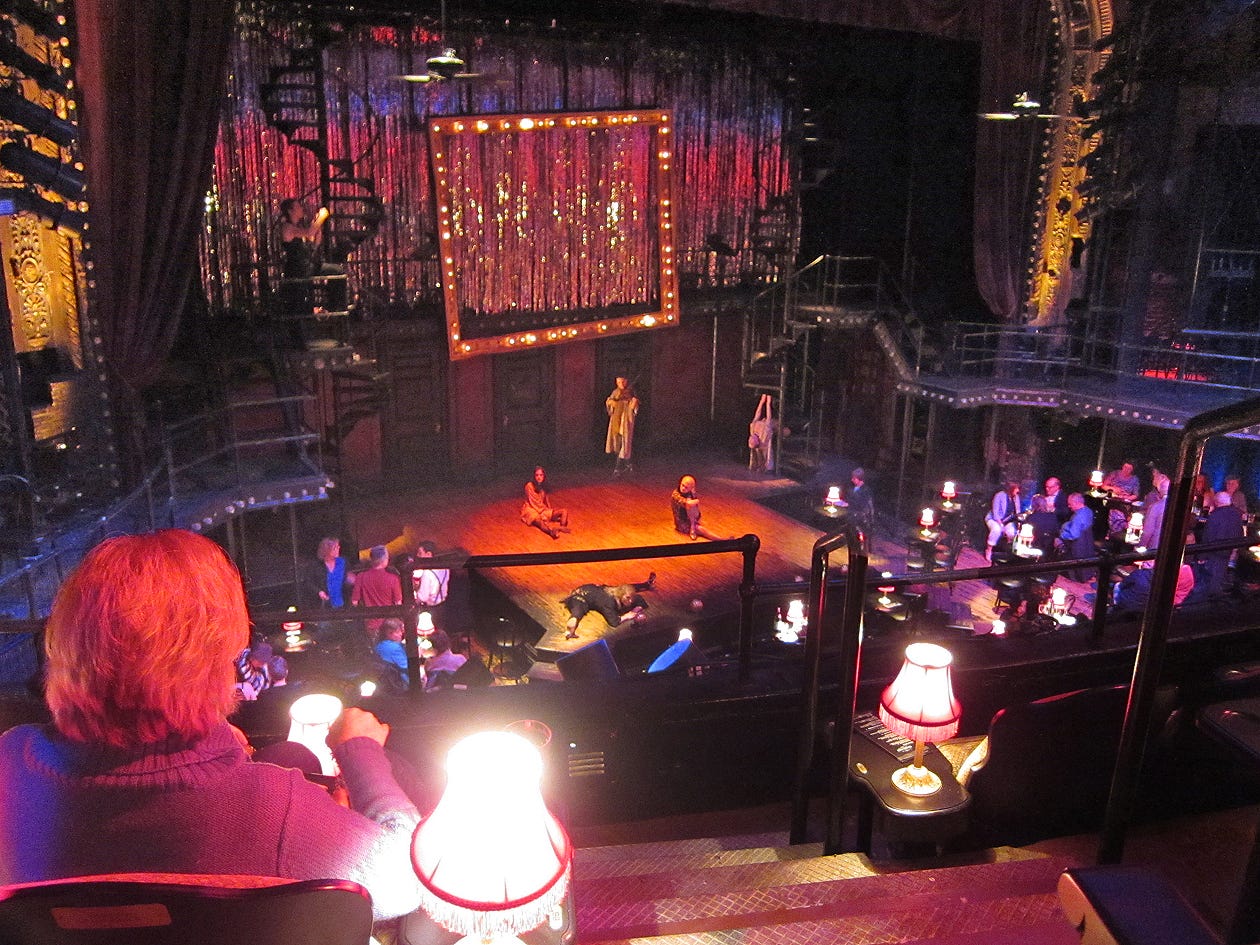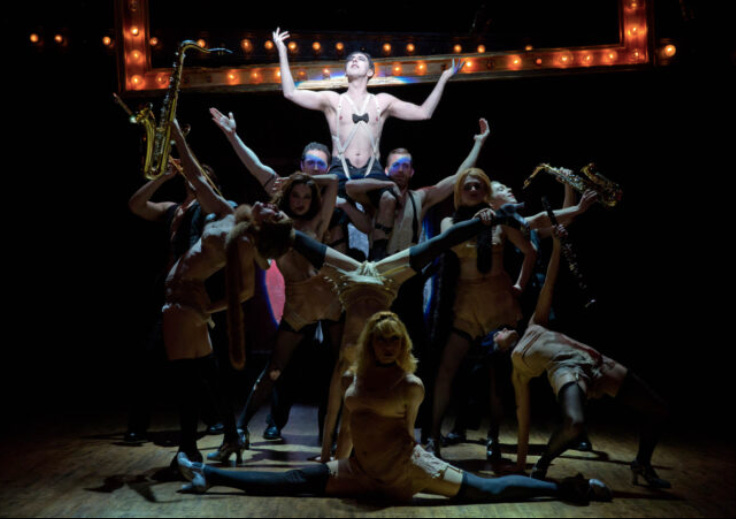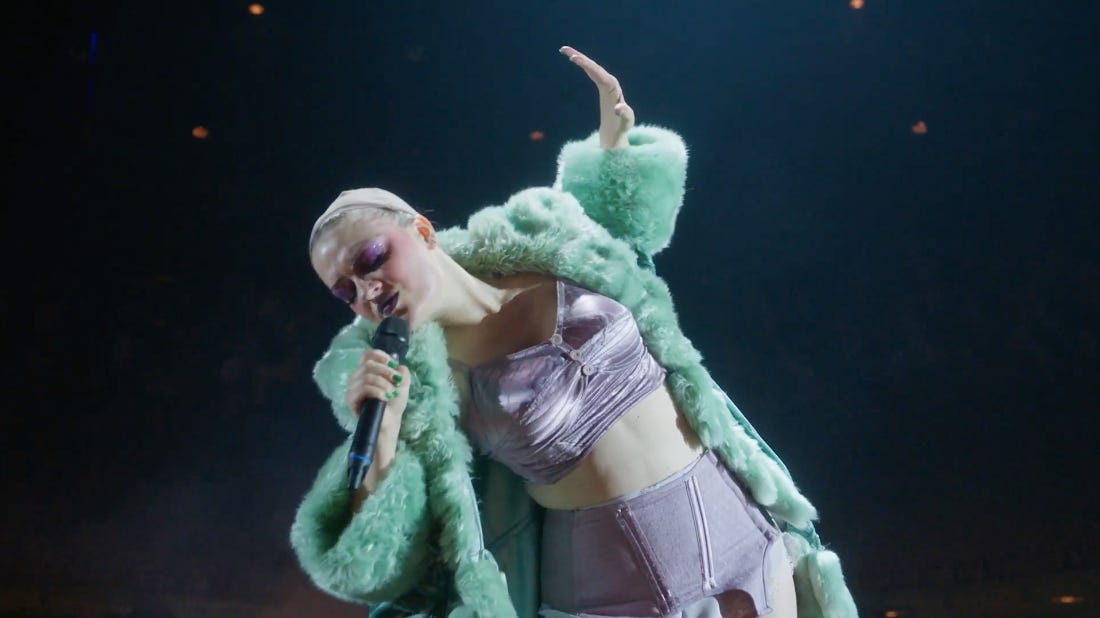‘Cabaret,’ American Exceptionalism, and History’s Worst Refrain
This 58-year-old musical is an essential text for understanding the 2024 U.S. sociopolitical terrain.
“I am a camera with its shutter open, quite passive, recording, not thinking.”
– Christopher Isherwood, Goodbye to Berlin
On the eve of 1930 in Berlin, the Jazz Age is dying as a man on stage leers at you.
The house band saunters through a vaudeville number, and the girls and boys of the Kit Kat Klub are mid-thrust in paper thin burlesque attire. The act is far from polished—this place may be a beacon for the queer and the culturally othered, but it’s also where C-grade talent goes to languish. It’s less of a planned performance and more like being invited to an ongoing orgy, led by the suspendered leering man.
This is the Master of Ceremonies. He startles at first sight, sashaying from behind the curtain like a ghoul in rouge. Through a gash of a grin, he charms the audience in three languages as he and the ensemble welcome the crowd with a number called “Willkommen.” In between groping his troupe-mates, he declares the club a safe haven from your woes. A bit aggressively, actually: “We have no—troubles—here.”
You can’t tell if you’re being seduced or sold to. It’s raunchy. Confrontational. The kind of scintillating showcase that makes you feel, per the Emcee, that “life is beautiful.”
You’d never know your generous host was frog-marching you towards imminent disaster.
Cabaret is an evergreen piece of art. One of the most revived shows in Broadway history, it’s also one of the first concept musicals; the 1966 libretto is written a little ambiguously, and the set design can be interpreted any which way.
Over six decades, this show has looked like a lot of things, but it has always only ever been about one: the fall to fascism of Germany’s Weimar Republic, rapt in its final frenzy of art, vice, freedom, and indulgence while the country is gasping for funds. Some called cabaret clubs one of the worst signs of “moral decay,” but frankly, you try coming out of World War I with so much debt that you have to ask the U.S. for a loan to survive the decade… only to have it end with the Great Depression.
In Cabaret, two musicals occur simultaneously: one in the real world and another within the Kit Kat Klub. We start with twin tales of doomed romance between lovers young and old. American writer Cliff moves to Berlin for inspiration, falls for impetuous club singer Sally Bowles, and tries to forge a stable life out of their whirlwind relationship. Cliff’s older landlady, Fräulein Schneider, is being adorably courted by Herr Schultz, a Jewish fruit vendor; the two of them plan to marry. As the Berlin they know—and the patronage of the club—mutates into a more polarized crowd, both couples are forced to reexamine their plans and themselves.
Meanwhile, on the limbo-like stage of the Kit Kat Klub, certain numbers are performed as snarky commentary on the real-life fascist threat encroaching from the streets of Berlin into the lives of our unsuspecting clubgoers. The wild thing is that when you listen to the Broadway cast album on its own, most of the songs sound delightfully happy—tunes for a gay ol’ time. Seeing the show live will taint everything you thought you knew: almost every song has a double-meaning, and the narrative you thought you would see is suddenly pointing the finger at you.
You don’t have to be into musicals to appreciate Cabaret. If you want to watch it in full (and I fervently hope you do), I recommend trying this 1993 revival, staged by Sam Mendes and with Alan Cumming as a fan favorite Emcee. There’s also the excellent 1972 Bob Fosse film adaptation—one of Liza Minnelli’s more exasperating performances—though it sacrifices an entire subplot for time and is somehow rated a paltry PG.
This show reads the modern-day American mindset for filth. Its story hangs upon the tenets of what academics now call The Authoritarian Playbook—inciting violence, attacking vulnerable communities, overreaching executive power… you know, things like insurrections, hate rallies, and presidential immunity. The real dramatic blow, though, is how Cabaret slowly pulls the rug from beneath viewers, implicating us in all of the above: that we’ve spent, screwed, drank, and danced our way around the creeping stench of fascism until it can’t not be our problem anymore.
A bold thing to do to an audience who’s simply seeking entertainment. It’s why Cabaret has never run out of fuel. We’re still—somehow, miserably—asking the same question as we were then: “How in the world did this happen?”
I can think of a few reasons.
Compromise as a Character Flaw

It starts as an innocent singalong at an engagement party. A guest starts belting a traditional German tune about their beautiful Fatherland and its limitless future. “Somewhere a glory awaits unseen / Tomorrow belongs to me!” A local political officer joins in; other guests smile and shake hands with him, link arms. They don’t seem bothered by his red arm band. “But soon says a whisper, ‘Arise, arise!’ / Tomorrow belongs to me!” Most of the partygoers are booming in sync now, chanting over the goose step of the oom-pah-pah’s: “The morning will come when the world is mine / Tomorrow belongs to me!”
This song is, inarguably, the scariest moment in Cabaret. (Take your pick of the stage version or the screen version.) It’s the first time we feel real anxiety out of our four protagonists, who are watching the energy shift. Suddenly the locals they’ve known for years seem unfamiliar, zealous in their support for this burgeoning “purist” party with claims of making Germany prosperous again. Cliff, at least, has already read enough about the Nazis to understand what’s happening.
You see, the officer from the party was the first friend Cliff made on the way into Berlin: Ernst Ludwig. It was he who pointed Cliff towards a place to stay above the Kit Kat Klub—and who dubiously offered to have him “run errands” to Paris for a nice sum of cash. Blinded by Ernst’s forwardness (and desperate for a buck), Cliff eventually took him up on it—only to find out that the smuggling he’d been doing was on behalf of the Nazi party.
At Schneider and Schultz’s engagement event, it’s the moment Ludwig innocuously removes his coat to reveal his arm band that knocks the guests (and the real audience) into a different energy. Cliff is rattled that someone who’s shown him such earnest warmth runs with such a hostile group—it spells the end of his love affair with Berlin, and it’s the moment he decides he can’t passively compromise any longer.
Sally, meanwhile, is realizing she may have made the wrong compromise at the wrong time. Having tamed her night-clubbing lifestyle to settle down with Cliff, she struggles to acknowledge the turmoil of reality around her. Berlin seems to be shrinking, gigs are hard to come by, money is running out, and Cliff can’t even get a job at a bank because they’re all being shuttered.
No merriment to disappear into, and now no spirits to drown fears in: she also discovers she’s pregnant. She and Cliff, desperate to make it work, decide that keeping the child might be the thing to keep them from drifting apart in a place like this.
It doesn’t last long. In any other context, I’d call compromise one of the best tools anyone can have in their kit. In Cabaret, it’s almost every character’s most destabilizing choice.
Entertainment as a Pacifier
Choosing kicks and giggles over serious matters might be the easiest choice of all—it was certainly already a way of life in Weimar Berlin. Sally embodies this: The fast life on stages and in people’s bedrooms is all transactional, and she knows it. The numbing glow of even the seediest club is always hovering at her shoulder, and always easier than facing her extremely vulnerable reality.
This brings us back to the Emcee, who’s an entirely unique character in musical theater. It’s been argued that he only exists outside of the story—while he’s part of the Kit Kat Klub commentaries, he’s also an ambiguous floating presence in every other song between characters. Like the eyes of Dr. T.J. Eckleburg in The Great Gatsby, he sees everything.
Even more sinister, if the Emcee isn’t a literal part of Cabaret’s dramatic narrative, he only exists for one reason: to lure you into the mirage. He’s not trying to charm you like a club patron; he’s leering at you from behind the fourth wall, making good on his promise from “Willkommen” to do away with your real-life troubles—by showcasing everyone else’s. He’s the active ingredient in your descent into apathy, and he’s not afraid to use the hard sell to get you there.
In fact, he sings one of the most shocking numbers in the musical theater canon: “If You Could See Her.” In direct comment to Fräulein Schneider’s fears that her business will be attacked for marrying a Jewish person—she’s so rattled that she calls off her engagement to Herr Schultz—the Emcee moseys onto the stage to sing this lovelorn tune not to a woman or a man, but a dancer with a gorilla mask on.
It’s a funny song, but only in the way a circus act with a trained animal is funny. Audiences titter through it uncomfortably. The Emcee is essentially singing in mock-defense of his choice of partner: “When we’re in public together, I hear society moan / But if you could see her through my eyes, maybe they’d leave us alone!” It gets silly and overwrought, and you can feel the audience passively waiting for the number to end. That is, until the Emcee leans towards the cheap seats and hisses the final lyric of the song: “If you could see her through my eyes, she wouldn’t look Jewish at all!”
It’s a painfully clever slap in the face. Not only is it a bright red flag in the diegetic story—the Nazi ideology has grown so prevalent that the Emcee is now incorporating blatant anti-Semitism to get butts in seats—but we, the real-life audience, have also just been tricked into thinking the way a racist thinks.
I want to point out that it wasn’t at all out of the question for queer people and other “undesirables” to acclimate to Nazi messaging as a way of survival during this time. Berlin had been such an early gay mecca, and many didn’t anticipate that changing. Friedrich Radszuweit, a gay businessman who ran a queer-focused publishing company from 1923-1933, is an apt example. With a “determination to project a well-behaved, middle-class image,” he reasoned that as long as queer people complied with shifting standards and policies, there would be no trouble.
Once the Hitler took power in 1933, they raided and shut down Radszuweit’s “degenerate” publishing operations. Queer publications made up a significant chunk of the first Nazi book burnings; those kicked off when right-wing students raided Berlin’s Institute of Sexual Research, the first non-profit dedicated to studying sexuality and gender.
Denial as a Last-Ditch Refuge
The thing about the rising unrest in Berlin is that Sally ultimately can’t contend with it. “What’s that got to do with us?” she asks Cliff incredulously.
Cliff, in his increasing panic, goes from muttering about how she needs to read a newspaper to dragging her showbiz dreams through the mud (“You keep talking about this as if it really existed!” he shouts). By the time Cliff is making the choice for them both to take an escape route to America by way of Paris, she’s already mentally departed from the relationship.
At the climax of the show, Sally performs “Cabaret”—an all-time Broadway banger, and the darkest “cheerful” tune you’ll ever hear. You wouldn’t know it until you see it performed live. On cast recordings, this song is joyful and rousing; in person, it’s paralyzing. This is not a diegetic performance; this is Sally stepping into limbo, dropping all decorum, and smothering her mounting anxieties with her old favorite delusions. She decides to forgo an escape from Germany in favor of having an abortion and chasing her gin-soaked nightclub dreams in perpetuity.
It’s not a confident decision; each production’s Sally performs this number with varying degrees of delusion, fear, and anger. Some Sally’s cry. Some of them scream at the mic like Hitler himself. (Amy Lennox’s 2022 rendition of “Cabaret” is an all-timer.) It’s a manic anthem for those who are desperate to keep their head in the clouds, as if this isn’t happening to her too.
In contrast, Fräulein Schneider chooses good ol’ apathy. She’s under no illusions about who and what the Nazis are, she just chooses to stay put, stay solo, and stay off everyone’s radar. Her number, “What Would You Do?” is a bitter rebuke to Cliff, who, being both sexually fluid and a foreigner with a removed point of view, can’t understand why leaving for safety doesn’t occur to her or Sally.
When you’re a person who’s usually ignored by government institutions and established systems, you assume that the goings-on at those levels have nothing to do with you. (“Suppose simply keeping still means you’ll manage until the end?”) This song is a thesis statement for inaction. If we didn’t have the hindsight of knowing what perils will follow, I have to wonder if we’d judge her as harshly for doing nothing.

We do, though, have the gift of hindsight. I just worry it’s been buried in favor of instant gratification and sensationalism—tuned out, swiped past, and bought out by our own needy faculties. This is exactly why Cabaret is a crucial text in this bend of American history: it’s the reflection we somehow still cannot meet. It’s no accident that Cabaret’s original stage production featured a huge, trapezoidal mirror upstage that showed the audience to themselves during crucial moments in the story.
For the same reason, the threat of fascism in Cabaret is almost passive at first. Remember, the goal of authoritarians isn’t ever to convince us to buy into their beliefs. The goal is to bore us with them—to flood the public and private spheres with their imagery and words so frequently that we stop being shocked, seeing and hearing it. It’s normalization by way of deluge, which slowly and surely leads to passive acceptance.
I can’t say whether Americans will employ enough hindsight to get out of the fascist theocracy that’s waiting to happen here in 2025. Even if history doesn’t repeat itself line by line, there are an avalanche of signs that it’s willing to rhyme. I hope we can heed warnings like Cabaret, which remains a viable moodboard for the social and psychological fallout of a people who’d rather wait for a third party to take charge while they passively observe, recording, not thinking.
For more on Cabaret & early queer movements under fascism:
"Cabaret & the Seductive Power of Evil" (@MattBaume on YouTube)
"Cabaret: The Musical" (@StagedRight on YouTube)
“CABARET with Richard Israel” (from A Musical Theatre Podcast)
‘Cabaret’: The Always Immersive Musical (Dougles Reside for the New York Public Library)
“Inside CABARET” (from Deconstructing Harold Hill by Scott Miller)
“The Gay Capital of the Nineteenth Century” (Alex Ross for The New Yorker)
“Episode 7: Friedrich Radszuweit” (from the Bad Gays podcast)
“The incredible story of the first known trans woman to undergo gender confirmation surgery” (Will Stroude for Attitude)
Commiserate with me in the comments, I think we all need that.
Also, FYI—this post is public and totally shareable. Kick off a conversation with some friends you think might get something out of this:









